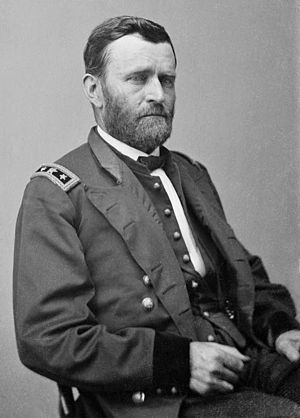book report: Grant and Sherman by Flood (2005)

It's been a while since I've read some Civil War history. This one came recommended on an article at Salon on the top 12 Civil War books, and I can say I recommend it as well. Charles Bracelen Flood focuses on the deep and sometimes strained friendship between U. S. Grant and W. T. Sherman, the great Union generals from the West. If this book were a meal, I'd call this a chicken pot pie lunch, comfort food, satisfying but not too filling. You won't get that many details on actual battles. You will get the big delicious parts though. This is less about blood and guts and more about relationships. Flood gives plenty of ink to their marriages, their in-laws, and their occupations between wars. Their inter-war (Mexican and Civil) lives were gaps in my knowledge and quite interesting to me. Flood seems unabashed in his support of the Union position. He does not subscribe to the "lost cause" historical mirage.  Image via Wikipedia
Image via Wikipedia
 Image via Wikipedia
Image via Wikipedia
 Image via Wikipedia
Image via WikipediaThis is a book of anecdote before analysis, but that does not mean there is no analysis, but he prefers to let the anecdotes have prominence. Two stories stood out to me. The first one I had never heard before, but I'm sure must have been part of any preacher's arsenal. It is set in the battle of Shiloh.
When Governor Harris came riding up to Johnston after the successful attack, the general beamed at him and said, "Governor, they came near to putting me hors de combat in that charge." He raised his boot to show that its sole was flapping loose, cut from the rest of it by a musket ball. Johnston's gray uniform had been slashed by other shots, but he seemed unharmed and exultant. He gave Harris a message to take to another officer; when Harris came back, he found Johnston groggy and about to fall out of his saddle. What Harris did not know was that, in a duel fought in Texas twenty-five years before, a pistol ball cut the sciatic nerve in Johnston's right leg in a way that left it numb. During the attack just minutes past, a musket ball had severed an artery in that leg, but as he bled profusely, Johnston felt nothing, and in the excitement and confusion of the moment, no one else saw what was happening. By the time Harris and others helped him to the ground, he was in critical condition. Even the the quick application of a tourniquet might have saved him - Johnston carried one in a pocket - but he had sent the nearest surgeon to help wounded men nearby, and none of his staff knew what to do. Within minutes, Albert Sydney Johnston died. p.110-111That is a wild story, and Flood tells it well. Another anecdote pointedly shows the hypocrisy of the miscegenation "fears" of the rebels, as related by one of Sherman's soldiers on the great march to the sea. A major from Illinois found an old woman, the mistress of a plantation, lecturing him that the Northern policy of freeing the slaves would lead to what she called "Amalgamation" - racially mixed children. "The old lady forced it on me," he recalled, "and as there were three or four very light colored mulatto children running around the house, they furnished me an admirable weapon - She didn't explain to my entire satisfaction how her slaves came to be so much whiter than African Slaves are usually supposed to be." p.270 Yes, the lost causers seem to ignore the de facto concubinage of slave women in their glorious confederacy.
Flood has previously written a post-war biography of Robert E. Lee and writes of him with admiration. He does not shy from the clay feet of anyone, yet does not dwell much on Grant's alcoholism. He certainly covers it, but not enough so that the reader wonders why Grant developed a reputation for drunkenness. Nevertheless, Grant was an innovative general, especially among the Union's leaders, and Sherman learned from him, enabling him to move with high speed through the south. It wasn't just the Union's abundance of materiel that enabled them to prevail, and Flood wants us to know that great generalship also contributed.
 Image via Wikipedia
Image via Wikipedia


Comments